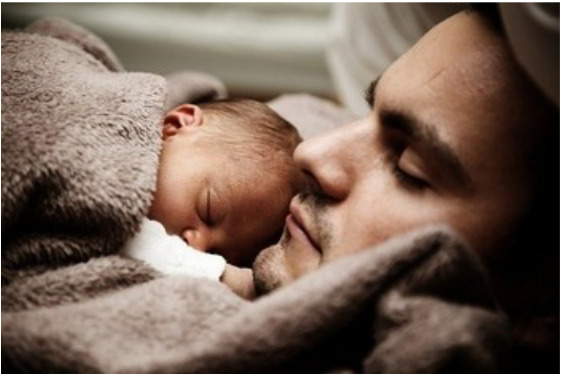
La période post-accouchement est un moment très particulier dans la vie d’une femme. Concentrée par l’arrivée du bébé, préoccupée par l’allaitement et les changements de son propre corps, une maman doit gérer de nombreux paramètres et le retour à la contraception, trop précoce, est souvent mal vécue. La question de la contraception masculine post-partum se pose donc tout naturellement, comme un relais bienvenu de la part du père. Pourtant, peu de parents y ont recours, c’est probablement parce que l’on connaît trop mal les moyens contraceptifs pour homme. Focus sur un mode de contraception qui pourrait bien soulager les mères et impliquer les pères dans le trio parents-bébé de la période qui suit l’accouchement.
Quelle contraception après l’accouchement ?
La contraception de la période post-partum est délicate : elle dépend du moment du retour de couche, de l’allaitement, l’utérus se remet en place. Il est parfois compliqué de revenir au un mode de contraception habituel ou de réfléchir à un contraceptif temporaire. Certaines contraceptions sont contre-indiquées. Pourtant, de nombreuses mères s’accordent pour dire que la première année avec un accouchement, elle préfèrent ne pas commencer une nouvelle grossesse. Quelles sont les solutions proposées ?
Les contre-indications à la contraception post-partum
Il n’est pas toujours possible de reprendre la même méthode de contraception après un accouchement. Il convient de prendre en compte les recommandations médicales dans les cas particuliers suivants :
allaitement,
pathologies survenues lors de la grossesse (prééclampsie, diabète gestationnel, phlébite, HTA gravidique, etc.),
risque thromboembolique veineux.
Les différentes méthodes contraceptives utilisables après un accouchement
Très rapidement après l’accouchement, les médecins proposent aux femmes de reprendre une contraception. L’état de santé de la mère permet de choisir une méthode de contraception adaptée :
les méthodes hormonales (pilule, anneau vaginal, patch transdermique, implant sous-cutané, injection intramusculaire), notez que les estroprogestatifs ne sont pas recommandés pendant 6 mois après l’accouchement ;
les dispositifs intra-utérins (DIU) ;
les méthodes barrières (préservatifs masculins et féminins, diaphragme, cape cervicale, spermicides, etc.)
Les méthodes naturelles sont elles adaptées à la contraception post-accouchement ?
Certains couples préfèrent utiliser des méthodes naturelles, notamment ceux qui ont opté pour un allaitement régulier. Ils se basent sur l’aménorrhée lactationnelle, en combinaison avec différentes méthodes non hormonales et peu intrusives, qui nécessitent une bonne information du couple. Correctement appliquée, cette méthode fonctionne en général très bien jusqu’au retour de couche.
Une seconde méthode de contraception naturelle, la contraception thermique masculine est une technique idéale pour la période post-partum : portée par l’homme, elle permet de soulager la femme de la charge contraceptive.
La contraception masculine : une proposition pertinente pour le couple
Les méthodes de contraception masculines sont en cours de développement. Elles répondent à une demande de la part de certains hommes, de pouvoir prendre leur part dans le choix d’avoir une contraception, et en particulier après un accouchement.
Quel avantage pour les hommes et les femmes ? Quels sont les freins au développement de ces techniques ? Comment participer à leur promotion et trouver un mode de contraception innovant et pertinent dans le cadre de la contraception post-partum en particulier et d’une meilleure répartition de la contraception en général.
Le rôle des hommes à l’arrivée d’un bébé
Longtemps, la grossesse et l’accouchement ont été une affaire de femmes, mais les hommes s’impliquent de plus en plus dans l’éducation des enfants, les soins aux nourrissons, l’évolution de la grossesse, l’accouchement, etc. Pourtant, certains d’entre eux auraient besoin de s’investir davantage pour se sentir à égalité avec leur compagne.
Les revendications des pères, autour des paternités innovantes, des congés de naissance, du congé parental masculin, s’intensifient et démontrent une évolution globale des mentalités, une redéfinition des rôles de genre et des rôles parentaux. La réflexion sur la contraception s’inscrit dans ce changement de société.
De quoi ont besoin les femmes après un accouchement ?
L’investissement masculin dans la contraception répond à un besoin des femmes, celui de partager davantage la charge contraceptive pour les soulager mentalement et physiquement.
La contraception féminine est une intervention corporelle implicante, parfois intrusive. Elle est acceptée par les femmes uniquement parce qu’elles n’ont pas le choix. La plupart des femmes cède à la nécessité contraceptive.
Pour un homme, prendre le relais est un des meilleurs moyens pour montrer à sa compagne qu’on la soutient profondément, intimement. La sexualité après l’accouchement n’est pas toujours facile à vivre pour une femme. La soulager sur la question contraceptive, c’est la rassurer et lui montrer son propre engagement dans la vie et les contraintes de la vie de famille.
Certains moment se prêtent parfaitement bien à un arrêt contraceptif pour les femmes : accouchement, problèmes gynécologiques ou hormonaux, cancers, tumeurs, après un avortement, etc. Les occasions sont nombreuses pour demander du relais.
Comment découvrir ces techniques contraceptives destinées aux hommes ?
Les soignants sont-ils prêts et formés pour répondre à ces préoccupations émergentes ? Quels sont les freins à une contraception plus partagée ? Les personnes intéressées par la contraception masculine naturelle sont souvent en manque d’information et de formation en matière de contraception alternative. La participation active des professionnels de santé est indispensable au développement des contraceptions naturelles et responsables.
Ce site vous permet de participer au développement d’une contraception qui vous ressemble. N’hésitez-pas à diffuser les informations et apporter vos témoignages : il y a des hommes et des couples qui ne connaissent pas encore cette méthode et qui seraient soulagés de pouvoir enfin la découvrir.
Marie Leloup – 26-04-2020